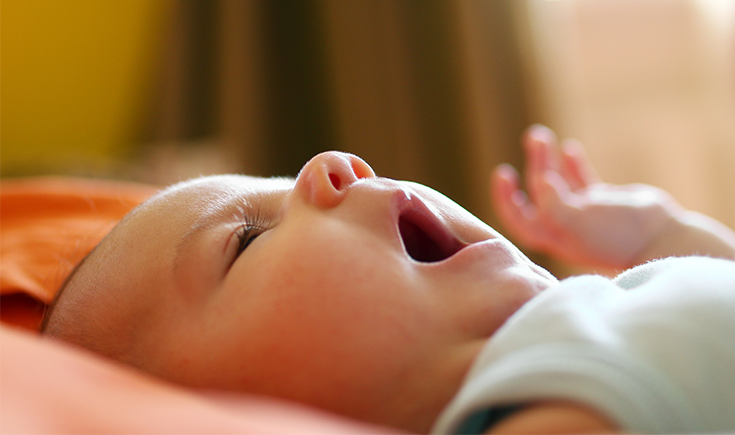

A newborn waking early in the morning is to be expected while their circadian rhythm becomes established, but if you have a baby over about four months old who is an early riser, you could be feeling frustrated or confused (not to mention, tired!).
You might not like to hear this, but this is completely normal for some babies. Many infants wake with the sunrise as early as 4 or 5am, so rest assured it’s not just your little one. However, there are several things you can try to possibly extend their sleep.
Any tweaks you make can take weeks before you see any changes to your baby’s sleep, but sometimes these changes occur anyway because their brain is developing. Every baby is unique, and it’s usually just a matter of experimenting to see what works.
Let’s look at some possible reasons why a baby wakes early, and what you can do to influence it.
Does your baby have any medical issues?
If you suspect your baby has any breathing issues, allergies, low iron, digestive issues or skin irritation, speak to your GP or maternal and child health nurse. It’s always a good place to start to rule out any underlying causes.
Is there something about your baby’s sleep environment?
Is your baby warm enough, or too warm? Are there any strong scents (such as laundry detergent), humidity, startling noises early in the morning, or stimulating toys or decor in the room? Is it too light in there when the sun rises? You could try white noise or ocean sounds to block out household or neighbourhood noises. You might choose to put up blackout blinds to control the morning light. If your baby is swaddled, they might be trying to get at their hands.
Is bedtime too early or too late?
Both overtiredness and under-tiredness can lead to early waking. You might like to see what happens if you move bedtime slightly earlier or later. During the day, you could observe your baby to watch for any tired signs, and respond by settling them to sleep even if it isn’t their usual nap times. Let the baby guide you. Some babies need a lot more or less sleep than others, and it’s always changing.
Is your baby stimulated enough during the day?
Ensure that your baby has plenty of time to play and move, and isn’t only restricted to swings, bouncers, or seats. It’s about finding the sweet spot for stimulation because you also don’t want to overstimulate them as it can lead to a build-up of cortisol, impacting sleep. Watch your baby’s signs for boredom, tiredness, or when they just need a break. Have a couple of baby-led days instead of running around all day if possible, and see if this makes a difference.
Is your baby going through a developmentally normal phase?
Your baby could be experiencing a developmental leap (read about Wonder Weeks), a sleep progression (usually around 4-5 months, 8-9 months, and 12 months), a growth spurt, or separation anxiety, all of which can temporarily impact sleep. Some signs to look for that something like this is going on could be your baby is extra clingy, crying more, and their feeding and sleeping patterns are changing.
Is your baby simply seeking comfort?
Babies wake for countless reasons as you would have discovered, but one of the biggest ones is because they want to be close to you, particularly if they’re sleeping independently. Could your baby be brought into bed with you when they wake and be cuddled? It could possibly extend their sleep, but read our guide to sharing a bed with baby first. Alternatively, you could put your baby’s cot sheet in your top during the day to get your scent on it so your baby feels closer to you.
Could you share the care in the mornings?
If possible, you could take it in turns with your partner or another caregiver to care for your baby while the other one of you sleeps. Go to bed early at least once a week, and schedule in rest time each day when possible, even if it’s only the weekends. It’s vital that you support your own sleep as well. Think about how the early rising makes you feel, and if it’s not a problem for you, then it’s not a problem. If your baby seems relatively happy during the day, then it’s most likely just their normal rhythm.























